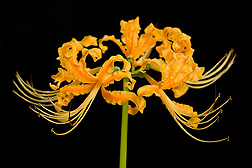This page has been archived and is being provided for reference purposes only. The page is no longer being updated, and therefore, links on the page may be invalid.
| Read the magazine story to find out more. |
|
|
New Korean Beauty at U.S. National Arboretum
By Alfredo FloresDecember 6, 2005
A flower species, Lycoris incarnata, previously thought to grow natively only in China, is also thriving in wild habitats in Korea, Agricultural Research Service (ARS) scientists report. Often called “surprise lilies” because they flower in dramatic and colorful ways, Lycoris plants are of widespread interest to ornamental horticulturists and hobbyists.
The discovery was made by a team of scientists led by U.S. National Arboretum (USNA) research horticulturist Mark Roh. USNA is administered by ARS, the U.S. Department of Agriculture's chief scientific research agency.
In 1998, USNA sponsored a trip to collect germplasm of various Lycoris species from the subtropical Anduck Valley on Jeju Island off the coast of South Korea, as well as from Japan and China. Roh worked in collaboration with Mun Seok Seong of Jeju-do Agricultural Research and Extension Services and Yong Bong Park of Jeju National University. Some 1,500 species of plants make a home on Jeju Island, one of the few preserved areas of wild habitat remaining in Korea.
Using molecular markers and chromosome study, the researchers proved that populations of unidentified Lycoris collected from the valley were, in fact, L. incarnata. They say it’s possible this accession was brought from China to Korea by bulb collectors, but no record of that has yet been found.
The Lycoris germplasm that Roh gathered is being kept in the Asian Collections maintained by Carole Bordelon in the USNA’s Gardens Unit in Washington, D.C., and in the ARS Floral and Nursery Plants Research Unit greenhouse in Beltsville, Md. Preserving the germplasm at different locations will make it possible to maintain the valuable materials permanently and to allow sharing of the germplasm for additional genetic and breeding studies in the future.
Relatively rare in this country, Lycoris species are especially valued for their beautiful or unusual features, especially their elaborate flowering patterns. Resistant to pests, Lycoris bulbs are very durable, tolerating extremes of both drought and waterlogging, as well as poor soil conditions.
Read more about the research in the December 2005 issue of Agricultural Research magazine.

